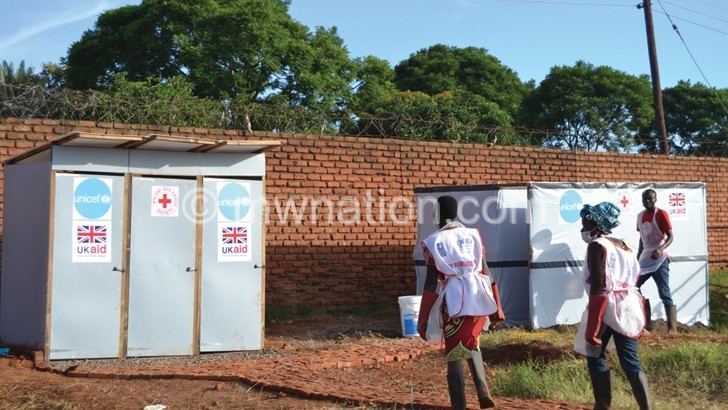Cholera on Killing spree
Five more people, including two family members, have died of cholera in the past week, bringing the cholera death toll to 17 and cases to 693.
Confirming the deaths in an interview yesterday, Ministry of Health (MoH) spokesperson Joshua Malango said three people, including a father and son, died in Karonga District in their shack at a fishing camp on the shores of Lake Malawi while in Salima two family members died of the disease on Friday.

With the cumulative number of the cholera cases now at 693, the number of deaths and cases have risen sharply since the first week of February when the figure was at 420 before it rose to 626 in the final week of the month.
However, Malango could not provide the circumstances surrounding the new deaths, but attributed the continued increase in cases to people’s negligence in seeking health care.
He said: “Yes we have new cholera deaths and they are, among them, two each from one family in Salima and Karonga districts.”
Last week, the Ministry of Health blamed some communities for their superstitious beliefs that cholera is caused by witchcraft.
“Patients die because, rather than rushing them to hospitals, relatives waste time by giving them traditional medicine that cannot cure them,” Malango said.
As of yesterday, Karonga still had the highest number of cases at 323 and seven deaths, followed by Lilongwe also with seven deaths and 213 cases. Salima has so far recorded 70 cases and three deaths, Dedza 26 cases; Nkhata Bay 20, Likoma Island 13; Rumphi 10; Nsanje six;Dowa five; Mulanje four; while Kasungu, Chikwawa, Blantyre have registered one case each.
According to Malango, four of the deaths in Karonga occurred at health facilities and the rest happened within the communities.
Similarly, out of the seven deaths recorded in Lilongwe, four occurred at health facilities—two at Bwaila and one each at Matapila and Kang’oma-—three deaths occurred within the communities of Kauma, Mchitanjiru and Kang’oma.
However, in Salima, all three recorded deaths occurred within the communities.
As of last week, the ministry was giving cholera vaccines in Karonga and Rumphi only, while Lilongwe communities were yet to start receiving the vaccines.
However, according to Malango, they are waiting for a second consignment of vaccines which will serve other districts where the cholera cases are increasing.
Meanwhile, the Ministry of Health is urging people to rush patients with cholera signs such as diarrhoea and vomiting to the hospital.
However, despite the ministry saying it is doing its best to control the outbreak, the Malawi Health Equity Network (Mhen) is on record as having asked government to increase its efforts in combating the outbreak other than pushing the blame on people.
Mhen executive director George Jobe told The Nation last week that there is need for government to intensify its communication strategy if cholera is to be defeated.
He said: “It is time to flood the country with cholera messages. We have to go local. Let us use the chiefs, church gatherings and other forums that people in villages use to communicate.”
Last week, the ministry declared five districts of Mulanje, Nsanje, Chikwawa, Nkhata Bay and Kasungu cholera-free after not registering new cases in over two weeks.
According to Malango, despite the rise in the number of cholera deaths, there is a high probability that more districts will attain a cholera-free status in due course.
The first cholera case was reported last November in Karonga after two businesspersons were infected in neighbouring Tanzania where there is also an outbreak.
According to World Health Organisation (WHO), cholera is an acute diarrhoeal infection caused by ingestion of food and water contaminated with a bacterium known as vibrio cholera.
The disease can lead to dehydration and even death within hours if left untreated. Most of those infected will have no or mild symptoms and can be successfully treated with oral rehydration solution.
Severe cases need rapid treatment with intravenous fluids and antibiotics.
Provision of safe water and sanitation is thus critical to control the transmission of cholera and other waterborne diseases. n





